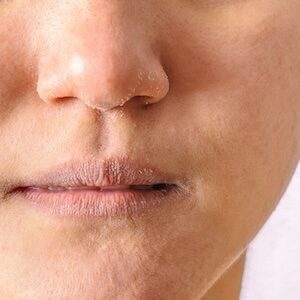Common Questions about Skin Dryness
- Posted on: Feb 27 2024
 As another harsh winter season comes to an end, many of us are currently contending with dry skin. With warmer weather on the horizon, you probably have a lot of questions about how to heal your dry skin – especially before you start wearing shorts and bathing suits again.
As another harsh winter season comes to an end, many of us are currently contending with dry skin. With warmer weather on the horizon, you probably have a lot of questions about how to heal your dry skin – especially before you start wearing shorts and bathing suits again.
The skin care experts at Forefront Dermatology, formerly Asarch Dermatology are here to answer all your dry skin questions, including what causes skin dryness, what the most effective treatments and home remedies are, and when you should visit a dermatologist.
Some cut-and-dry facts about your skin
Recent studies confirm that winter skin troubles, including skin dryness, plague the majority of Americans. In fact, 60 percent deliberately change their skin care routine during cold weather to help resolve these issues.
And for good reason – your skin must fight to retain moisture all winter long. The double-whammy combination of cold air and low humidity strips water away from the surface of your skin, leaving small clumps of dead skin cells that make your skin feel drier and rougher. Dry skin is often itchy, and flaky or scaly patches may develop. The most severe dry skin can crack and bleed.
Almost everyone will experience dry skin during their lifetime. However, some people are more at risk, including:
- Older people – Our skin produces less sebum (a natural oil that keeps skin soft) as we age. In your 40s, the amount of sebum your body makes drops dramatically – and continues to drop over time.
- People who take certain medications – Dry skin is a possible side effect of several medications, including diuretics and statins.
- People who work with water – If your job requires you to frequently put your hands in water or use harsh chemicals, your skin loses its protective layer faster. Nurses, housekeepers, hairstylists, and construction workers often have dry skin.
- People who are vitamin-deficient: Your skin needs nutrients to keep it healthy. If you don’t get enough vitamin D, vitamin A, iron, zinc, or niacin, you may develop dry skin.
- People with other skin conditions: Dry skin is a symptom of many skin conditions, including dermatitis, psoriasis, eczema, and more.
Now, let’s discuss common questions about skin dryness.
How is dry skin diagnosed?
To diagnose dry skin, your dermatologist will ask about your medical history and symptoms, discuss your skin care routine, and perform a physical exam.
We may also order tests to verify health conditions that cause dry skin, such as:
- Allergy test (to find the source of allergic reactions)
- Blood test (to check for diabetes, kidney disease, or thyroid issues)
- Skin biopsy or tissue sample (to test for skin conditions)
What are the treatment options for dry skin?
Your dermatologist will recommend a treatment plan with one goal in mind: to bring much-needed moisture back to your skin.
Moisturizers
Moisturizers are the primary form of treatment for most types of dry skin. Moisturizers help soften dry skin while recreating your skin’s protective layer at the same time.
Moisturizers come in many forms, including ointments, creams, lotions, and oils. If you have very dry skin, your dermatologist may recommend specific moisturizing products that are formulated for your needs.
Medications
Hydrocortisone cream can help soothe any redness or itching. For extremely dry skin, your dermatologist may suggest a prescription cream or ointment. If your skin cracks open, we may prescribe wet dressings to help prevent infection.
What home remedies are best for dry skin?
There are many things you can do at home to help keep your skin moist and healthy:
Moisturize often
Apply your moisturizer of choice several times a day, especially when your skin feels dry to the touch and after washing your hands or bathing. Look for healing ingredients such as ceramides, glycerin, shea butter, and cocoa butter. Do not use moisturizers that contain sodium lauryl sulfate, which can dry your skin further.
If you have mature skin, you can help prevent flaky, scaly skin by using products that contain alpha hydroxy acid and/or antioxidants. Moisturizers often form the basis for wrinkle creams, with added retinoids, peptides, and other ingredients.
Gently wash your face at least twice a day
Use a gentle, alcohol-free, non-foaming cleanser on your face twice a day and after sweating. (If you have sensitive skin, use a cleanser in the evening and rinse with water at other times.) While your skin is still damp, apply any medication(s) you’re using for dry skin and then apply your moisturizer.
Limit bath time
Long baths or showers and hot water remove the natural oils within your skin. Bathe no more than once a day and for no longer than 5-10 minutes, using warm water only.
Wear fabrics that are kind to your skin
Natural fibers like cotton allow your skin to breathe. Fabrics like wool or polyester can irritate dry skin. Use a laundry detergent that is free of dyes and perfumes to protect your skin even further.
Avoid foods and drinks that dehydrate you
Avoid foods and drinks that contain caffeine, salt, sugar, or alcohol, which all pull water from your body and can cause dehydration.
Use a humidifier
Hot, dry indoor air can make dry skin worse. A humidifier adds moisture to the air inside your home.
When should you visit a dermatologist for dry skin?
If the above remedies don’t relieve your dry skin or your symptoms get worse, visit your dermatologist so we can create a personalized skin care plan for you.
Contact us right away if your dry skin:
- Is painful to the touch
- Itches constantly
- Looks infected (red, warm, swollen, etc.)
- Develops a rash
You don’t have to fight dry skin alone
Leave you high and dry? Never at Forefront Dermatology, formerly Asarch Dermatology.
To learn more about your options for treating dry skin, schedule an appointment with one of our board-certified dermatologists today.
Posted in: Skin Care
